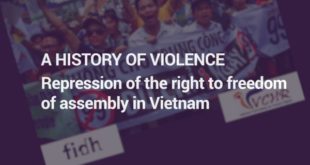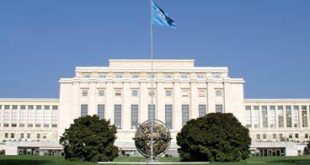Tom Lantos Human Rights Commission (TLHRC)
Hearing on
HUMAN RIGHTS AND RELIGIOUS FREEDOM
IN VIETNAM
Tuesday, March 23, 2010, B-318 Rayburn House Office Building, Washington D.C.
Persecution of the Unified Buddhist Church of Vietnam
Written Testimony by VO VAN AI
Overseas Spokesman of the Unified Buddhist Church of Vietnam
President, Quê Me: Action for Democracy in Vietnam & Vietnam Committee on Human Rights
Honorable Chairman,
Distinguished Members of Congress,
Recent acts of brutality against monks and nuns at the Bat Nha Monastery and Phuoc Hue Pagoda in Lam Dong have drawn international attention to Vietnam’s repression of Buddhism, the country’s majority religion. But the violence suffered by members of the Lang Mai (Plum Village) Community over the past few months is but one instance in an on-going, ruthless campaign of persecution, orchestrated at the highest levels of the Communist Party and State and implemented methodically over the past thirty five years against Vietnam’s largest independent Buddhist organization, the Unified Buddhist Church of Vietnam (UBCV).
Since 1975, when Vietnam was united under Communist rule, the authorities have sought to suppress the independent UBCV, heir to a 2,000-year tradition of Vietnamese Buddhism. Because it refused to join the State-sponsored Vietnam Buddhist Church and submit to Communist Party control, the UBCV was outlawed, its pagodas, schools, universities and hospitals confiscated or destroyed, its monks, nuns and followers arrested, tortured and even murdered. Violence reached such a pitch that in November 1975, 12 monks and nuns self-immolated at the Duoc Su Monastery in the province of Can Tho in a plea for religious tolerance and freedom.
Today, repression against the UBCV continues unabated, but government strategies have changed. To avoid international condemnation, Vietnam is using more subtle, sophisticated methods to stifle the UBCV and conceal repression from the public eye. Instead of arresting Buddhist leaders and putting them on trial, the government seeks to isolate and silence them by subjecting monks to house arrest without trial, interrogations and harassments. Hundreds of UBCV pagodas are currently under Police surveillance, communications are censored, telephones are cut off, visits and movements are monitored. Police terrorize UBCV followers, warning that they may be arrested, lose their jobs, or their children be expelled from school if they frequent UBCV Pagodas. The government’s Religious Security Police (cong an ton giao) control all activities, and under-cover agents disguised as monks are planted in Buddhist Pagodas to report on all movements and seek to create schisms between Buddhist leaders to undermine the UBCV from within.
Not only UBCV Buddhists, but international figures who show sympathy for the UBCV are subjected to assaults and harassments. Just last week, on 16th March, Mr. Thor Halvorssen, film producer and President of the New York-based Human Rights Foundation, was assaulted and interrogated by Security Police, simply because he paid a visit the UBCV Patriarch Thich Quang Do in Saigon. As he walked out of the Thanh Minh Zen Monastery, Mr. Halvorssen was accosted by secret police. One struck him sharply in the back, and pushed him violently. Three others ran towards him, and the four men shouted at him in Vietnamese and English “Why are you in the Pagoda? What did you do there ?” After searching his bag, they took Mr. Halvorssen to a nearby building, where he was detained for questioning by a high-ranking officer wearing 5-star epaulettes. The officer demanded the reasons for his visit, warning Mr. Halvorssen that it was not a “real” Buddhist temple, and was not sanctioned by the State. He was detained for questioning for over 90 minutes. Mr. Halvorssen, who suffered bruises from the assault, reports that plain clothes security police and uniformed officials are posted all around the Thanh Minh Zen Monastery.
This incident reveals the flagrant duplicity of Vietnam’s religious policies against the outlawed UBCV. Thich Quang Do has never been indicted, nor accused of any crime. At the United Nations and other international forums, Vietnam repeatedly denies Thich Quang Do is under detention, claiming that he is “completely free”. Yet a simple visit to Thich Quang Do is perceived as a crime, punishable by assault and intimidation. In fact, Thich Quang Do is a prisoner in his pagoda, denied freedom of communication, travel, and even his citizenship rights. Since he was released from prison in a government amnesty in 1998, Thich Quang Do has never been granted the obligatory residence permit (ho khau), without which he remains an illegal citizen. He is forbidden to receive his disciples or preach inside the Monastery. Two Security officers block the staircase leading up to his room. Two others control the public address system in the main prayer hall, ready to cut off the microphone if he tries to address Buddhist followers. Thich Quang Do, a 2010 Nobel Peace Prize nominee, has spent over 29 years in prison, internal exile and under house arrest.
If Vietnam does not hesitate to inflict this treatment on an international personality such as Mr. Halvorssen, it is clear that 86 million Vietnamese citizens suffer a more tragic fate. Indeed, the leaders and members of over 20 UBCV Provincial Representative Boards set up to bring spiritual and humanitarian aid to people in the Central and Southern provinces suffer routine harassments, interrogations and intimidation. Their efforts to bring badly-needed aid to the poor and needy in terms of education, charity, welfare and spiritual support are systematically impeded.
In 2009-2010, Venerable Thich Vien Dinh, UBCV Secretary General and Superior monk at the Giac Hoa Pagoda in Saigon, was repeatedly summoned for Police interrogations along with other monks during key festivals such as the Vesak (Buddha’s Birthday) or the Lunar New Year, thus preventing them from holding Buddhist ceremonies. On 24th January 2010, during a ceremony to award proficiency badges to members of the Buddhist Youth Movement (Gia dinh Phat tu, an UBCV-sponsored educational movement similar to the Scouts), over 40 Security Police broke into Giac Hoa Pagoda, disbanding the gathering and terrorizing Buddhist followers. On March 15th 2010, the authorities fined monks at Giac Hoa Pagoda the sum of 6 million VN Dongs on trumped up administrative charges. Members of UBCV Representative Boards in Quang Nam-Danang, Thua Thien Hue, Binh Dinh, Khanh Hoa, Ba Ria-Vung Tau, Dong Nai, Hau Giang, An Giang and Saigon (Ho Chi Minh City) have suffered similar restrictions and harassments.
Vietnam’s policy of “stealth repression” against the UBCV is extremely dangerous. Although it has failed in its final objective – that of paralyzing and ultimately suppressing the UBCV – it has shifted international focus away from the serious, on-going religious persecution against this peaceful Buddhist community. In the State Department’s Human Rights Report for 2009, in the section on religious and political activists detained under house arrest in Ho Chi Minh City, there is no mention of Thich Quang Do.
It is imperative that the US Congress, and particularly the Tom Lantos Human Rights Commission, shine light on this grave situation and press Vietnam to cease repression against the outlawed UBCV. As Vietnam seeks to play a greater role upon the global stage, and takes the Chair of ASEAN and the new ASEAN Intergovernmental Human Rights Commission, it must uphold its international obligations on religious freedom and human rights.
For these reasons, I sincerely urge the United States to re-designate Vietnam as a Country of Particular Concern, as recommended by the US Commission on International Religious Freedom, until it re-establishes the legal status of the Unified Buddhist Church of Vietnam and other non-recognized religions, and releases UBCV Patriarch Thich Quang Do and all other UBCV Buddhists detained under house arrest because of their peaceful advocacy of religious freedom, democracy and human rights. The UBCV should regain full religious freedom, independent of the Communist Party and its “mass organizations” body, the Vietnam Fatherland Front, and enjoy the right to choose its own leaders without state interference. This is a litmus test of Vietnam’s true commitment to an improved relationship with the United States. The promises and pledges of the Vietnamese leaders will be meaningless if they are not prepared to take these basic steps.
Paris, 23rd March 2010
 Quê Me Quê Me: Action for democracy in Vietnam & Vietnam Committee on Human Rights
Quê Me Quê Me: Action for democracy in Vietnam & Vietnam Committee on Human Rights


